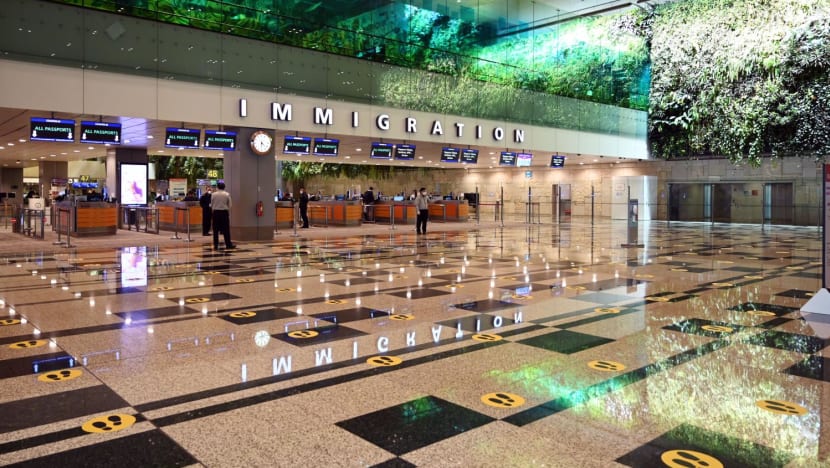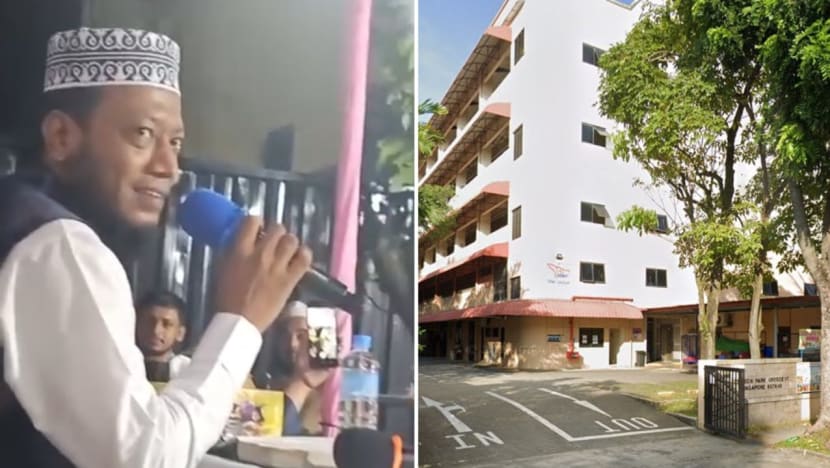About 2,500 visitors refused entry at Singapore’s checkpoints every month: Shanmugam
Members of Parliament had asked questions about Singapore's border security measures after Bangladeshi extremist preacher Amir Hamza managed to enter Singapore using a passport with a different name.

File photo of the immigration checkpoint at Changi Airport Terminal 3. (Photo: Marcus Mark Ramos)

This audio is generated by an AI tool.
SINGAPORE: About 2,500 visitors to Singapore are refused entry every month for various reasons, Law and Home Affairs Minister K Shanmugam said on Monday (Sep 9) in the wake of the case involving Bangladeshi extremist preacher Amir Hamza, who entered the country illegally.
Members of Parliament had asked questions about Singapore's border security measures after Amir Hamza used a passport with a name different from what was in the country’s security databases.
“Since 2022, every month, about 30 visitors with legitimate passports but containing a different identity from ICA’s records, were detected and refused entry,” Mr Shanmugam told parliament.
"In all, for various reasons, about 2,500 visitors are refused entry at our checkpoints every month."
Amir Hamza entered the country on Aug 9 and illegally preached to Bangladeshi migrant workers at the Lantana Lodge dormitory in Tuas, propagating extremist and segregationist teachings. He left Singapore the next day and the authorities received police reports on Aug 12.
Mr Shanmugam said no arrests have yet been made as investigations into the case are ongoing.
“The offences that are being looked into include participation in an unlawful assembly under the Public Order Act, and not obtaining a Miscellaneous Work Permit required under the Employment of Foreign Manpower Act,” he said.
The dormitory operator, who organised the event, is being investigated for several offences, including those under the Public Order Act, Employment of Foreign Manpower Act and Foreign Employee Dormitories Act, the minister added.
About 30 visitors with legitimate passports but containing a different identity from the records of the Immigration and Checkpoints Authority (ICA) were detected and refused entry every month since 2022. In all, about 2,500 visitors are refused entry at Singapore’s checkpoints every month. Home Affairs Minister K Shanmugam shared these statistics in reply to MPs’ questions in Parliament on Monday (Sep 9), following the undetected entry of Bangladeshi extremist preacher Amir Hamza on Aug 9. Mr Shanmugam told the House that Amir Hamza was on Singapore’s watchlist but he had used a passport with a name that was different from that in ICA’s database. As this was his first visit to Singapore, Singapore did not have his biometrics. If he tries to come back again, regardless of what other passport he uses, he will be picked up because Singapore now has his biometrics, said Mr Shanmugam. Turning to questions on border security, Mr Shanmugam said there are about 600,000 travellers every day coming and going across all of Singapore's checkpoints. He stressed the need to develop a framework for picking up some people of concern while allowing the vast majority to clear as quickly as possible. Singapore has to strike a balance between security and facilitation, he said. He gave the assurance that the majority of persons perceived to have dubious reasons or purposes for coming into Singapore are picked up but this is not always possible and a small number will get through. Updating the House on the ongoing investigations into the case of Amir Hamza, he said no arrests have yet been made. The offences that are being looked into include participation in an unlawful assembly. The dormitory operator, who is also the event organiser, is being investigated for several offences. Mr Shanmugam said the Government will continue to educate and remind dormitory operators to ensure that they obtain the relevant approvals before conducting such activities. He urged the public to stay vigilant and report such individuals and activities to the agencies.
VISA APPLICATION PROCESS
The Immigration and Checkpoints Authority (ICA) takes a “risk-based, multilayered approach” in deciding whether to let a traveller enter Singapore, Mr Shanmugam said.
Those from certain countries must apply for an entry visa. Applications from people on Singapore's watchlist or which look dubious are rejected, he said.
Mr Zhulkarnain Abdul Rahim (PAP-Chua Chu Kang) asked if the process for visa applications would be reviewed, noting that Bangladeshi applicants require letters of introduction from a contact in Singapore. They also have to go through an authorised visa agent in their home country.
In response, Mr Shanmugam said that in the case of Amir Hamza, he had a visa and a local sponsor, but there was no agent involved. This was because the person who sponsored him is related to the dorm operator, and that person is being investigated as well.

BROADER SECURITY MEASURES
Mr Shamugam said ICA also uses information from the SG Arrival Card which visitors have to submit, as well as the advance passenger information from airlines, flight manifests and other sources of information, to conduct pre-arrival risk assessments.
Visitors are screened against a watchlist of individuals as they undergo immigration clearance upon arrival here.
“Those on the watchlist or identified to be of higher risk by ICA’s backend data analytics will be checked further,” said Mr Shanmugam.
“ICA officers also look out for persons whose reasons for visiting Singapore may appear dubious, or for other reasons would require further checking, and they might be required to undergo further checks.”
The Multi-Modal Biometric System was introduced into Singapore’s border screening regime in July 2020, Mr Shanmugam noted.
“First-time visitors will have their facial, iris and fingerprint images captured at immigration clearance, and that allows us to better detect repeat visitors who may try and come in using multiple identities or impersonated identities,” he said.
“For foreign visitors, this is usually done, obviously, on the first occasion they visit Singapore. Our automated gates are generally able to detect forged passports as well.”
REGISTERED BIOMETRICS
In Amir Hamza’s case, Mr Shanmugam said the Internal Security Department had placed him on its watchlist using his name, due to his past statements promoting religious intolerance, and his reported involvement in a pro-Al-Qaeda organisation in his home country.
“He applied for a visa to enter Singapore using a passport using a name that was different from what we had in our database, and therefore that other name was not on our watchlist, and he used that same passport on Aug 9 to come into Singapore. As this was his first visit to Singapore, we did not have his biometrics,” he said, explaining why the Bangladeshi preacher was not detected at entry.
Moving forward, he will be detected if he tries to re-enter Singapore again, regardless of what passport or name he goes under, as his biometrics are now registered, said Mr Shanmugam.
He added that Singapore takes border security very seriously and ICA continuously augments its border screening regime.
Mr Shanmugam said that while no system is foolproof, there are different levels of checks in place to ensure security at the borders.
“But it is always possible that a small number will get through despite the several levels of checks,” he said.
“There are about 600,000 travellers every day, coming into Singapore, across all our checkpoints. We have to develop a framework for picking up some people of concern while allowing the vast majority to clear as quickly as possible.
“You need to strike a balance between security and facilitation at our borders. It is not possible nor practicable to subject every visitor, obviously, to stringent detailed checks and interviews.”
Mr Shanmugam added that no country, including Singapore, has a “comprehensive database of every criminal or person of security concern across the world”, and that a balance has to be struck between ensuring security and facilitating travel through the country’s borders.
















